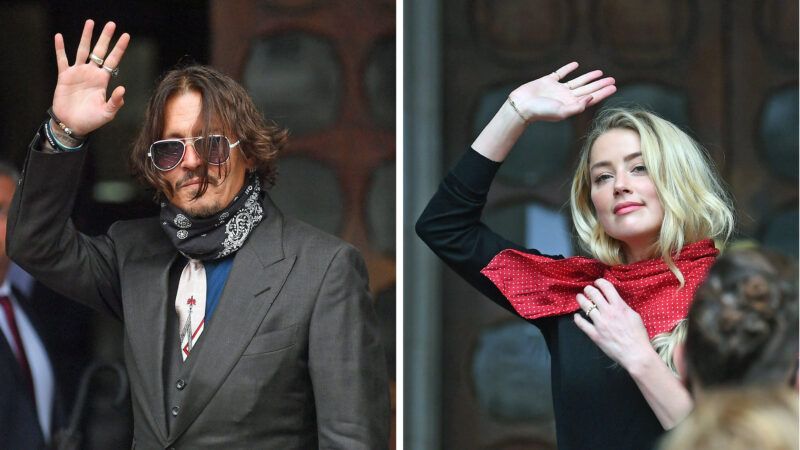Why Johnny Depp Is Suing Amber Heard in Virginia
The Pirates of the Caribbean actor is taking advantage of the state's lax laws that make it easier to file frivolous lawsuits intended to quell speech.

On Monday, April 11, Johnny Depp's lawsuit against ex-wife Amber Heard will move forward in a Virginia courtroom. The case is likely to involve allegations from the couple's troubled marriage, which ended in 2017 amid accusations of abuse from both parties. But regardless of the details or the outcome of the trial, the suit could set a bad First Amendment precedent.
The suit stems from a December 2018 op-ed that Heard wrote in The Washington Post. In the brief article, Heard refers to herself as "a public figure representing domestic abuse." Though she never refers to anyone by name, Depp claimed in a defamation lawsuit filed in early 2019 that "[t]he op-ed's clear implication" was that he was her abuser. In the filing, Depp asked for $50 million in compensatory damages, plus punitive damages and attorney's fees.
What makes the suit peculiar is not the facts but the venue: Depp filed the lawsuit in Fairfax County Circuit Court in Virginia. Depp and Heard each live in California, they lived in California as a married couple, and the article in question ran in a newspaper based in Washington, D.C. In fact, in a motion filed in 2019, Heard claimed that "To the best of my knowledge, I have never traveled to Virginia in my life."
It is not immediately clear how Virginia factors into the equation at all, until you consider the state's weak anti-SLAPP law.
SLAPP stands for Strategic Lawsuit Against Public Participation. It refers to a specific type of defamation claim filed with the intent to shut down or intimidate someone for their speech even if it is not actually defamatory. These suits are relatively inexpensive to file but can be ruinously expensive to defend against. A defendant without considerable resources may end up acquiescing to the lawsuit's demands just to avoid the hassle.
Anti-SLAPP laws are intended to counterweight such suits. Anti-SLAPP laws are state laws that tend to allow defendants to cut off frivolous lawsuits early without having to go through the lengthy and expensive process of taking such a case to trial, if they can demonstrate that the suit is unlikely to prevail. Some even allow the defendant to be reimbursed for attorney fees by the person who filed the bogus lawsuit.
Depp faces an uphill battle: To prove defamation against a public figure requires demonstrating that the speaker was motivated by "actual malice," meaning either knowingly lying or demonstrating "reckless disregard" over whether what they were saying was true. Regardless of Depp's intentions in filing the suit, winning would require proving that Heard had reckless or ill motivations in writing an op-ed which never mentioned him by name.
California, where both Depp and Heard primarily live and work, has a very robust anti-SLAPP statute. As does Washington D.C., home base of the paper that ran Heard's op-ed. Virginia, on the other hand, has an anti-SLAPP law which the Public Participation Project describes as merely "adequate," with no provision allowing a defendant to stop the proceedings early. In recent years, Virginia lawmakers who attempted to strengthen the law were repeatedly unsuccessful. Therefore, if Depp can make even the most narrow justification for why the case should be tried in Virginia, it is much more difficult for Heard to get the suit thrown out or moved to a different venue in a state with more aggressive anti-SLAPP laws. As it happens, Depp successfully argued that Virginia is the proper venue because The Washington Post maintains web servers, as well as a printing plant, in the state.
Depp is not the first person to take advantage of Virginia's comparatively toothless anti-SLAPP statute: In 2019, then-Rep. Devin Nunes (R–Calif.) filed numerous lawsuits against tech companies, news organizations, and even parody Twitter accounts, in Virginia courts, despite none of the defendants having direct ties to the state. Nunes had little success: In one ruling, Judge Robert Payne of the U.S. District Court for the Eastern District of Virginia transferred Nunes' lawsuit against CNN from Richmond to New York City, bemoaning that Virginia "cannot stand as a willing repository for cases which have no real nexus to this district."
Nunes' lawsuits, if successful, would have been injurious to free speech and a free press. Depp's suit carries the same danger, undermining decades of Supreme Court precedents that hold that it should be more difficult to prove defamation against a politician or public figure so as to promote free and open debate on matters of public interest. In fact, Heard will be allowed to argue during trial that she should be protected from Depp's suit because her op-ed concerned a matter of public importance. But Virginia's lack of a robust anti-SLAPP law means that future defendants without Heard's resources may not have that option.


Show Comments (43)